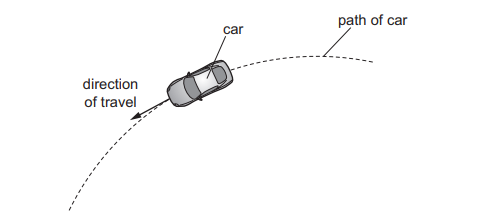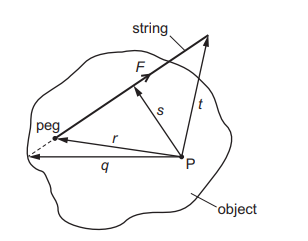Question
A metal wire is loaded up to the limit of proportionality.
Which statement is correct?
- Hooke’s law is not obeyed when the load is increased from zero to this point.
- When the load is increased beyond the limit of proportionality, the diameter of the wire will increase.
- When the load is removed, the wire returns to its original length.
- Up to the limit of proportionality, there is no change in the shape of the wire.
Answer/Explanation
Ans:
C
Question
Two forces $P$ and $Q$ act on a metre rule as shown. The metre rule is pivoted at one end. The rule starts to rotate in a clockwise direction.

Which statement is correct?
A $P$ equals $Q$
B $P$ is less than $Q$
C $(P \times a)$ is equal to $(Q \times b)$
D $(P \times a)$ is greater than $(Q \times(a+b))$
Answer/Explanation
Ans:D
Question
The diagram shows a wooden beam PQ, of negligible weight, which is attached to a wall by a
hinge at P and kept in a horizontal position by a vertical rope attached at Q.
The beam is 3.0 m in length.
A man of weight 800 N walks along the beam from P to Q.

What is the distance of the man from P when the tension in the rope at Q becomes equal to 500 N?
A 0.53 m
B 1.1 m
C 1.9 m
D 2.5 m
Answer/Explanation
Ans: CQuestion
A car moves in a circular path as it turns a corner on a horizontal road.
The car moves at constant speed.

Which description of the forces acting on the car is correct?
A. All the forces are balanced as the car is moving at constant speed.
B. The forces are unbalanced and the resultant force acts away from the centre of the circle.
C. The forces are unbalanced and the resultant force acts towards the centre of the circle.
D. The forces are unbalanced and the resultant force is in the direction of travel of the car.
Answer/Explanation
Ans: C

